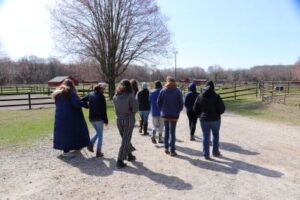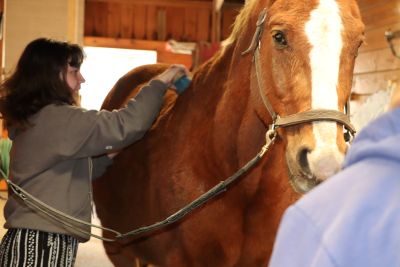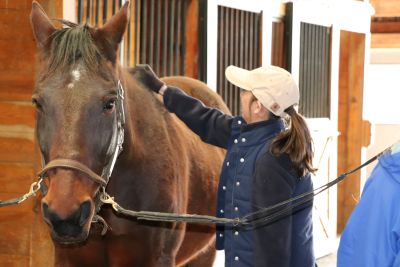For the Spring 2025 semester, Mitchell College students from diverse majors had the extraordinary opportunity to travel weekly by school van to an equine facility in Old Lyme to work with Rolex, Blessing, and several other horses for a new general education course.
“Equine-Assisted Wellness: Bridging Ability and Wellness,” offered in partnership with High Hopes Therapeutic Riding, Inc., immersed students in an experience that promoted wellness through the unique human and horse bond. As an organization, High Hopes uses equine-assisted services to support individuals with emotional health challenges, learning or developmental disabilities, and other neurodivergent challenges.
Working regularly with the horses in the barn, in the arena, and outdoors, the students developed an understanding of disability, learned practical skills in horsemanship and therapeutic techniques, and explored the principles of holistic wellness, focusing on mental, emotional, and physical health. Student majors comprised early childhood education, exercise science, criminal justice, communication, and psychology.

Students explore the grounds of High Hopes Therapeutic Riding.
Marci Bender, High Hopes equine operations director and PATH Intl. certified master therapeutic riding instructor, CTRI, led the course with assistance from Kim Severance, CTRS, High Hopes program coordinator, PATH Intl. certified therapeutic riding instructor and PATH Intl. equine specialist in mental health and learning.
Prior experience with horses was not a prerequisite for the course, although some students brought it with them
Melanie Hintz, a communication major, has ridden horses for 10 years and volunteered at another therapeutic riding facility in Connecticut for five years. She said one of her favorite activities was creating an obstacle course for the horses in the arena. Using the obstacle course to build trust, the activity mimicked what it is like for horses to experience the world with limited sight.
“Three of us had to partner and walk the course with the horse. One person was the leader, one person was blindfolded, and one person assisted. Horses can’t see everything and must trust humans to lead them in many situations. When I was blindfolded, it was scary, but I trusted the person who was leading me to keep me safe. It can be challenging to trust and rely on teamwork in life, but I realized the importance of having an open mind and viewing life from different perspectives,” said Melanie.
Instructor Kim Severance said the activity also taught the students how to work together and how to connect and communicate with the horse.
“As students experienced things, they could settle into what to expect,” she said.
Chloe Athanas, a criminal justice major who has worked with horses since she was 7, said she loves building bonds with horses and other people and learning new things.
“My favorite activity from class is when we groomed the horses. We had to use our voice and body language to communicate with them so they could trust us and feel comfortable. I learned that body positions and facial expressions are the key methods of communication between humans and horses,” said Chloe.
For a horse, yawning can be a sign of releasing tension, sniffing can show curiosity, alert and moving ears display an awareness of the environment, and ears pulled back or shifting weight can indicate unease.
Instructor Marci Bender stressed that observation is how we learn to connect with horses and that behaviors are important.
“Understanding what horses are experiencing helps with our work at High Hopes. It’s like putting a puzzle together through observation. You think through what you see, then evaluate the possibilities, Marci said.
Melanie agreed: “Horses communicate through body language, which requires us to pay close attention and try to understand what emotions they are feeling, whether it’s calmness, anxiety, or discomfort. I aspire to adopt this mindset, focusing on using all senses to observe and understand subtle details in life, rather than just relying on our usual senses.”
“I know how therapeutic riding can transform lives. This class deepened my knowledge of horses and provided me with a greater understanding of different approaches to training and therapy. My classmates all had the same enthusiasm for horses, and I enjoyed learning with them,” Melanie added.
The class is slated to be offered again in Spring 2026.


